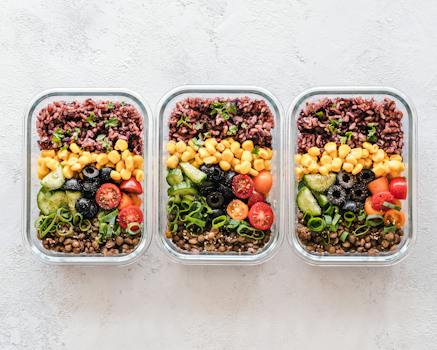
Clean eating is a buzzword that has been gaining popularity in recent years. It refers to the practice of consuming whole, unprocessed foods and avoiding processed and packaged ones. Many people have adopted this lifestyle for its health benefits, including improved energy levels. By nourishing the body with nutrient-dense foods, clean eating can help to stabilize blood sugar levels, reduce inflammation, and increase overall vitality. In this article, we will explore the key principles of clean eating and how it can contribute to improved energy levels.
- 1. Introduction
- 1.1. What is clean eating?
- 1.2. Why is it important for energy levels?
- 1.3. How does clean eating improve overall health?
- 2. Foods to Include in a Clean Eating Diet
- 2.1. Fresh fruits and vegetables
- 2.2. Whole grains
- 2.3. Lean protein sources
- 2.4. Healthy fats
- 2.5. Herbs and spices
- 3. Foods to Avoid in a Clean Eating Diet
- 3.1. Processed foods
- 3.2. Artificial sweeteners
- 3.3. Highly refined carbohydrates
- 3.4. Sugary drinks
- 3.5. Trans fats
- 4. Benefits of Clean Eating for Energy Levels
- 4.1. Improved digestion
- 4.2. Steady blood sugar levels
- 4.3. Increased nutrient intake
- 4.4. Reduced inflammation
- 4.5. Better sleep quality
- 5. Tips for Incorporating Clean Eating into Your Lifestyle
1. Introduction
Clean eating is a term that has gained popularity in recent years as people become more aware of the impact of their diets on their overall health. Simply put, clean eating means consuming whole, unprocessed foods that are free from additives, preservatives, and other artificial substances. The benefits of clean eating are many, including improved energy levels, better digestion, and a stronger immune system. In this article, we will explore the importance of clean eating for improving energy levels and how to incorporate it into your daily life.
1.1. What is clean eating?
Clean eating is a lifestyle approach to food and nutrition that emphasizes consuming whole, unprocessed foods. It involves avoiding highly processed and refined foods, artificial ingredients, and additives. Instead, the focus is on eating nutrient-dense foods like fruits, vegetables, whole grains, lean proteins, and healthy fats. The goal of clean eating is to nourish the body with wholesome foods that provide sustained energy, improve digestion, and support overall health and well-being.
1.2. Why is it important for energy levels?
Clean eating is a popular practice that focuses on consuming whole, unprocessed foods in their natural state. The benefits of this lifestyle change are numerous, but one of the most notable is the improvement in energy levels. By eliminating processed foods filled with sugar and unhealthy fats, the body is better equipped to function at its optimal level. In this article, we will explore why clean eating is important for improving energy levels, and how it can lead to a healthier, more vibrant life.
1.3. How does clean eating improve overall health?
Clean eating refers to the practice of consuming whole, unprocessed foods that are free from additives, preservatives, and other artificial ingredients. This means choosing fresh fruits and vegetables, whole grains, lean proteins, and healthy fats over processed foods that are often high in sugar, salt, and unhealthy fats. By adopting a clean eating lifestyle, individuals can improve their overall health in a variety of ways, including increased energy levels, improved digestion, and weight loss.
2. Foods to Include in a Clean Eating Diet
Clean eating is all about consuming whole foods that are minimally processed or refined. Here are some foods that should be included in a clean eating diet:
1. Fresh fruits and vegetables
2. Whole grains
3. Lean proteins such as chicken, fish, and beans
4. Nuts and seeds
5. Healthy fats such as avocado and olive oil
By incorporating these foods into your diet, you can help improve your energy levels and overall health.
2.1. Fresh fruits and vegetables
Fresh fruits and vegetables are essential components of a clean eating diet. They are rich in vitamins, minerals, and antioxidants that are important for maintaining good health. Fruits and vegetables also contain fiber, which helps to promote healthy digestion and keep you feeling full for longer periods of time. Some great options to include in your diet are leafy greens, berries, citrus fruits, and cruciferous vegetables like broccoli and cauliflower. By incorporating these fresh foods into your meals, you can enjoy better energy levels and overall well-being.
2.2. Whole grains
Whole grains are an essential part of a clean eating diet. They are packed with nutrients that can help improve energy levels and overall health. Whole grains are rich in fiber, vitamins, and minerals, which can reduce the risk of heart disease, diabetes, and other chronic illnesses. Some examples of whole grains include brown rice, quinoa, oats, whole wheat bread, and whole grain pasta. These foods are easy to incorporate into meals and can provide sustained energy throughout the day.
2.3. Lean protein sources
Lean protein sources are an essential part of a clean eating diet. They provide the body with the necessary amino acids to repair and build muscle tissue, while keeping you feeling full and satisfied. Some great options include skinless chicken breast, turkey breast, lean cuts of beef, fish, tofu, and eggs. These sources of protein are low in saturated fat and provide important nutrients such as iron, zinc, and B vitamins. When selecting your protein sources, aim for organic and grass-fed options whenever possible to avoid added hormones and antibiotics.
2.4. Healthy fats
Healthy fats are an essential part of a clean eating diet. They provide the body with energy and help to regulate hormones. Some great sources of healthy fats include nuts, seeds, avocado, coconut oil, and olive oil. These foods are also rich in vitamins and minerals that are important for overall health and wellbeing. Including healthy fats in your diet can help to improve energy levels, support healthy skin and hair, and reduce inflammation in the body.
2.5. Herbs and spices
Herbs and spices are a great addition to a clean eating diet. Not only do they add flavor without the need for added salt or sugar, but many herbs and spices also have health benefits. For example, turmeric has anti-inflammatory properties, while cinnamon may help regulate blood sugar levels. Other herbs and spices to include in a clean eating diet include ginger, garlic, basil, oregano, and rosemary. Experiment with different combinations to find your favorite flavor profile.
3. Foods to Avoid in a Clean Eating Diet
When adopting a clean eating diet, it’s important to avoid processed and packaged foods. These often contain added sugars, preservatives, and artificial flavors that can negatively impact your energy levels. Some specific foods to avoid include sugary drinks, snacks, and desserts, processed meats, and refined grains. Instead, focus on whole, nutrient-dense foods like fruits, vegetables, lean proteins, nuts, and seeds that will provide your body with the energy it needs to thrive.
3.1. Processed foods
Processed foods are a big no-no when it comes to clean eating. These foods are often loaded with preservatives, artificial ingredients, and added sugars, all of which can wreak havoc on your body and leave you feeling sluggish. Instead, focus on eating whole foods that are minimally processed and as close to their natural state as possible. This includes fresh fruits and vegetables, lean proteins, whole grains, and healthy fats. By avoiding processed foods, you’ll not only feel better but also improve your overall health and energy levels.
3.2. Artificial sweeteners
Artificial sweeteners are often found in processed foods and are meant to provide a sweet taste without the added calories of sugar. However, studies have shown that consuming artificial sweeteners can have negative effects on health, such as increasing the risk of metabolic disorders and disrupting gut bacteria. Therefore, it is best to avoid artificial sweeteners in a clean eating diet and opt for natural sweeteners like honey or maple syrup in moderation.
3.3. Highly refined carbohydrates
Highly refined carbohydrates are one of the main culprits when it comes to unhealthy eating habits. These types of carbohydrates are often found in processed snacks, white bread, and sugary drinks. They are quickly digested by the body, which can lead to spikes in blood sugar levels and subsequent crashes. In a clean eating diet, it is important to avoid these types of foods and instead opt for whole grains, fruits, and vegetables that are rich in fiber and nutrients. By doing so, you can maintain steady energy levels throughout the day and avoid the negative effects of highly refined carbohydrates.
3.4. Sugary drinks
Sugary drinks are a definite no-no in a clean eating diet. These drinks are loaded with sugar and offer little to no nutritional value. They can also cause a spike in blood sugar levels, leading to energy crashes and cravings for more sugar. Instead of sugary drinks, opt for water, herbal tea, or unsweetened beverages. If you need a little flavor, try infusing your water with fruits or herbs.
3.5. Trans fats
Trans fats are a type of unsaturated fat that are commonly found in processed foods. They are created when liquid vegetable oils are partially hydrogenated, making them solid at room temperature. Trans fats are often used to give foods a longer shelf life and improve their texture. However, they have been linked to numerous health problems, including heart disease, inflammation, and insulin resistance. In a clean eating diet, it is important to avoid foods that contain trans fats, such as fast food, fried foods, baked goods, and processed snacks. Instead, focus on consuming whole, unprocessed foods that are rich in nutrients and free from harmful additives.
4. Benefits of Clean Eating for Energy Levels
Clean eating has numerous benefits for improving energy levels. By consuming whole, unprocessed foods, the body receives a steady stream of nutrients that provide sustained energy throughout the day. This is in contrast to consuming refined, high-sugar foods that cause energy crashes and leave the body feeling sluggish. Additionally, clean eating promotes better digestion and gut health, which can also contribute to increased energy levels. Overall, incorporating clean eating habits into one’s diet can lead to improved energy levels and a more productive, fulfilling lifestyle.
4.1. Improved digestion
Clean eating not only provides numerous benefits for energy levels, but also for digestion. By consuming whole, unprocessed foods and avoiding artificial ingredients and sugars, the digestive system is able to function optimally. This leads to improved absorption of nutrients and less strain on the digestive organs. Additionally, incorporating foods high in fiber, such as fruits and vegetables, can further aid in digestion by promoting regularity and preventing constipation. Overall, clean eating is a powerful tool for improving both energy levels and digestive health.
4.2. Steady blood sugar levels
Maintaining steady blood sugar levels is one of the key benefits of clean eating for energy levels. When you consume foods that are high in refined sugars and carbohydrates, your blood sugar levels spike quickly, providing a short burst of energy, followed by a crash. This cycle can leave you feeling sluggish and tired. Clean eating, on the other hand, focuses on consuming whole, unprocessed foods that provide a slow, steady release of energy throughout the day. This helps to keep your blood sugar levels stable and your energy levels consistent, so you can power through your day with ease.
4.3. Increased nutrient intake
Clean eating has been shown to increase nutrient intake, leading to improved energy levels. By consuming whole, unprocessed foods, individuals can obtain a variety of vitamins and minerals that are essential for optimal bodily function. Nutrient-dense foods such as fruits, vegetables, lean proteins, and whole grains provide the body with sustained energy, allowing individuals to feel more alert and focused throughout the day.
4.4. Reduced inflammation
Clean eating has been shown to reduce inflammation in the body, which can lead to improved energy levels. Inflammation can cause fatigue and sluggishness, making it harder to get through the day. By eliminating processed foods and focusing on whole, nutrient-dense foods, the body is able to function more efficiently and effectively. This can lead to increased energy levels and a greater sense of well-being.
4.5. Better sleep quality
Clean eating has been shown to have numerous benefits for our overall health, including our energy levels. By consuming nutrient-dense, whole foods and avoiding processed and refined foods, we can improve the quality of our sleep and wake up feeling more rested. This is because clean eating supports the body’s natural circadian rhythms, which regulate our sleep-wake cycle. Additionally, clean eating can help reduce inflammation in the body, which has been linked to poor sleep quality. So if you’re looking to improve your sleep and wake up feeling more energized, consider incorporating more clean, whole foods into your diet.
5. Tips for Incorporating Clean Eating into Your Lifestyle
Incorporating clean eating into your lifestyle can seem overwhelming at first, but with a few simple tips, it can become a natural part of your routine. Start by focusing on whole, unprocessed foods such as fruits, vegetables, lean proteins, and whole grains. Cut back on added sugars, saturated and trans fats, and processed foods. Meal planning and prepping can also help you stay on track. Try experimenting with new recipes and flavors to keep things interesting. And remember, it’s okay to indulge in moderation. Clean eating is all about balance and nourishing your body with wholesome, nutrient-dense foods.
5.1. Plan ahead and meal prep
Plan ahead and meal prep are crucial when incorporating clean eating into your lifestyle. Set aside time each week to plan out your meals and snacks, and then prep as much as you can in advance. This will help you avoid the temptation of reaching for unhealthy options when hunger strikes. Consider investing in quality meal prep containers and kitchen tools to make the process easier and more enjoyable.
5.2. Read nutrition labels
Reading nutrition labels is an important aspect of clean eating. Look for products with minimal ingredients and no added sugars or preservatives. Pay attention to serving sizes and the amount of nutrients, such as protein, fiber, and vitamins, in each serving. This will help you make informed decisions about the foods you consume and ensure that you are fueling your body with healthy options.
5.3. Make small changes gradually
Start by making small changes gradually. Don’t try to completely overhaul your diet overnight. Instead, focus on making one or two changes at a time. For example, try swapping out processed snacks for whole foods like fruits and vegetables. Or, start cooking at home more often instead of relying on takeout. These small changes can add up over time and make a big difference in your overall health and energy levels.
5.4. Find healthy substitutes for your favorite foods
One of the biggest challenges when it comes to clean eating is finding healthy substitutes for your favorite foods. Luckily, there are many options available that can help satisfy your cravings without sacrificing your health goals. For example, if you love pasta, try swapping traditional wheat pasta for a healthier alternative like zucchini noodles or spaghetti squash. If you have a sweet tooth, try satisfying your cravings with fresh fruit or dark chocolate instead of processed sweets. By making these simple substitutions, you can still enjoy your favorite foods while staying on track with your clean eating goals.
5.5. Listen to your body and adjust as needed
Listen to your body and adjust as needed. Clean eating is not a one-size-fits-all approach. Each person’s body is unique and may respond differently to certain foods. Pay attention to how your body reacts to the foods you eat and adjust accordingly. If you feel bloated or sluggish after eating a certain food, it may be best to avoid it. On the other hand, if you feel energized and satisfied after eating a particular food, incorporate it into your diet more often. Trusting your body’s signals is key to creating a sustainable clean eating lifestyle.
Conclusion
In conclusion, clean eating can greatly improve energy levels and overall health. By incorporating whole, nutrient-dense foods into your diet and avoiding processed and artificial ingredients, you can fuel your body with the energy it needs to thrive.


